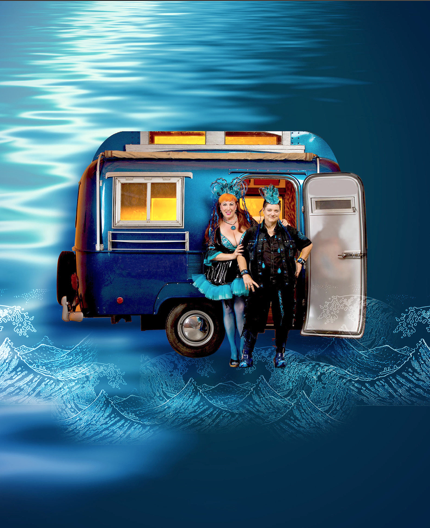UC Santa Cruz art professor and multimedia artist Elizabeth Stephens and her artistic collaborator Annie Sprinkle will present their latest film at the Museum of Modern Art in New York.
Titled Water Makes Us Wet—an Ecosexual Adventure, the film chronicles the politics and pleasure of H2O from an ecosexual perspective. It screens on February 25 as part of the Doc Fortnight Film Festival, followed by a discussion with the filmmakers and a dozen of their friends who helped work on the film.
Traveling around California in their E.A.R.T.H Lab mobile unit, Stephens and Sprinkle interact in the film with a diverse range of people, including performance artists, biologists, water treatment plant workers, and scholars. Questioning the complex history and politics of water, they meet with an array of water experts, activists, spiritual advisors, and just regular folks, exploring our relationship with water.
Along the way, Stephens and Sprinkle commune with elephant seals, consult an oracle, plunge a toilet, and contemplate the flavor bouquet of drinking water made from wastewater. They even crash San Francisco’s Pride Parade with erotic water chants.
The result is a quirky collage of facts, thoughts, and feelings about water—entwined with an ecosexual philosophy about the intimate and life-giving qualities of the most vital liquid on Earth.
As the artists note in their Director’s Statement:
“The experience we try to communicate with Water Makes Us Wet is that of possibility. While this documentary highlights environmental dangers and corporate irresponsibility, it’s also about beginnings, change, and how we can better love and nurture the creatures and ecosystems we share our lives with.”
Water Makes Us Wet flowed from various impulses: a deep concern for the natural world, a love of water, an appreciation for the possibilities of performance art, and our adventurous, creative partnership. The documentary is our attempt to compassionately co-align queer perspectives and environmental action.
It also is part of our ongoing efforts to explore and expand what can be considered erotic and sexy. We believe, as filmmakers, activists and artists, that the environmental movement is in desperate need of narratives that don’t only offer doom, gloom, and guilt, but also offer sensual pleasures and joy within environmental action.”
Stephens and Sprinkle’s previous film, Goodbye Gauley Mountain: An Ecosexual Love Story, was released in 2013. Documenting a trip back to Elizabeth’s hometown of Gauley Bridge in West Virginia, the 70-minute documentary is about the fight to save the region from the destruction of “mountaintop removal” coal mining, a further extension of conventional strip mining techniques.
Calling it “heartfelt, haunting, and downright provocative,” the Huffington Post noted that Goodbye Gauley Mountain was “one of the most captivating environmental documentaries of the year.”
For more information about the New York screening on February 25, visit the MoMa website.



